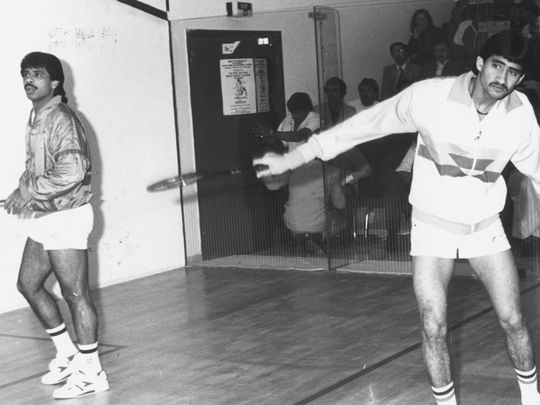
Not many competitive athletes can boast a record quite like Jahangir Khan’s. Not only did the Pashtun squash champion win the British Open – considered by many to be the Wimbledon of that sport – a record ten times, Khan also enjoyed a staggering 555 consecutive wins from 1981 to 1986. It’s a record that transcends squash – no professional athlete or team in the modern era can match it. However, in the years since Khan retired, Pakistan has slipped down the squash rankings. Where the country once counted Khan and his (unrelated) rival Jamsher Khan as mainstays in the top ten, today there is a single Pakistani in the top 50 (at number 50).
Khan attributes this to the country’s young players failing to put in the requisite effort. “These things require dedication and passionate involvement. Without hard work, [success] will not happen. There are no shortcuts.” For Khan, every child is born with the basic building blocks of a champion, but “it’s a question of what they do with it throughout their life”. He recommends the youth study their more successful peers in other countries to learn from and adapt their winning techniques.
He’s speaking from a place of experience. “Getting to the top level when I was 15 and becoming world champion at 17, I think it changed a lot for me. Most teenagers in that age group are in high school or getting ready for college, but my opportunity was totally different. I think that for me this was fortunate. I learnt a lot and I think it made me a strong person. At a young age I was travelling on my own, playing matches. When you go to a match or go abroad, it gives you a sense of self- confidence, hard work and discipline. Being given those things at that age, I think it taught me a lot.”

Getting to the top level when I was 15 and becoming world champion at 17, I think it changed a lot for me. Most teenagers that age are in high school or getting ready for college.
Turning to the sport in general, Khan doesn’t understand why squash isn’t yet an Olympic sport. “It has 25-30 million people playing it around the world, but when the Olympics is on you’ll see niche sports that no one’s even heard of. The World Squash Federation [WSF] tried really hard for London 2012. The Olympics should really update the criteria, increase the number of sports and athletes.” A former President of the WSF, Khan is now its Emeritus President.
However, his career has a tragic origin story. His older brother Torsam, also a squash pro, collapsed on the court during a tournament in Australia. He was 27 years old and seemingly in excellent health. This had a profound impact on the young Jahangir. “Torsam and I had a 12-year age gap. I always looked up to him and he was an ideal personality for me. I used to copy the things he did. In my life, I’ve not met [many people with that kind of personality].
“Although he had a very short life, even when he wasn’t here in this world, he would motivate me during training. I think that made me stronger and I learnt a lot from it. This was a really hard time for me. He never got to see his role in what I achieved in life, but I promised that I would fulfil his dream and, thanks to Allah, within two years I became world champion. I always had his motivation in my thoughts and whatever I did, that helped. He was my ideal man. Of course, my father was also a great coach. I learnt a lot from both of them at a very young age.”









